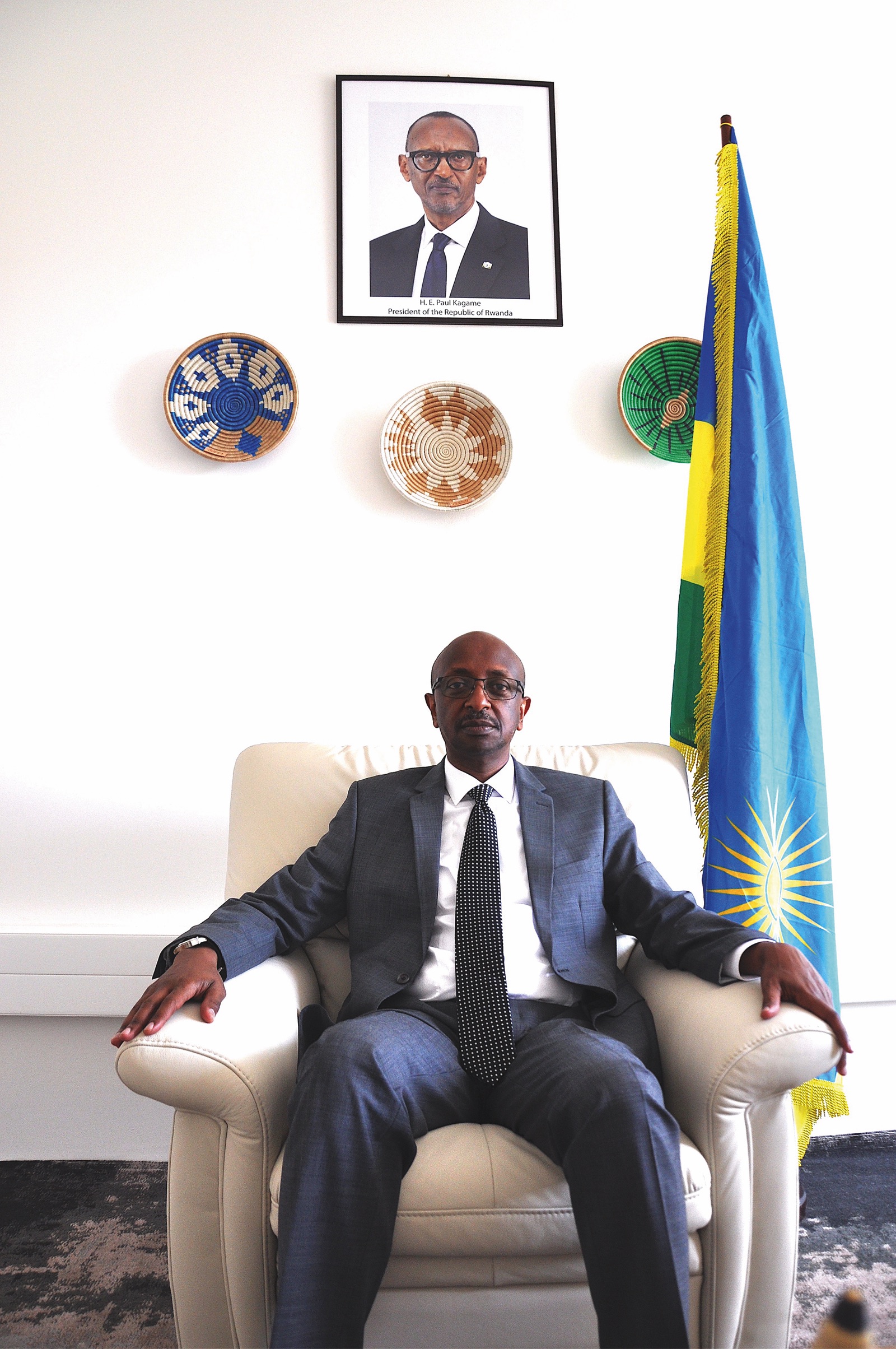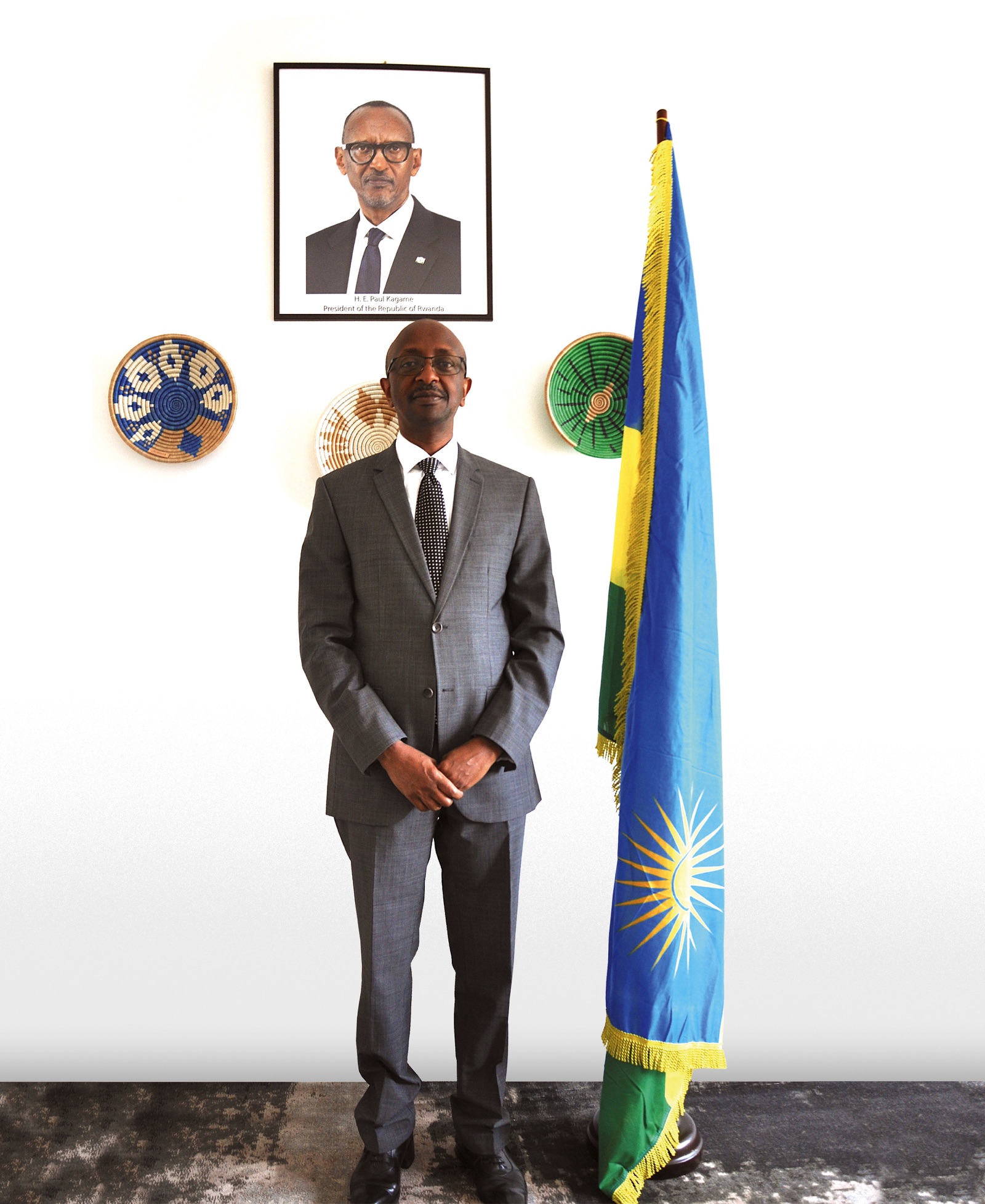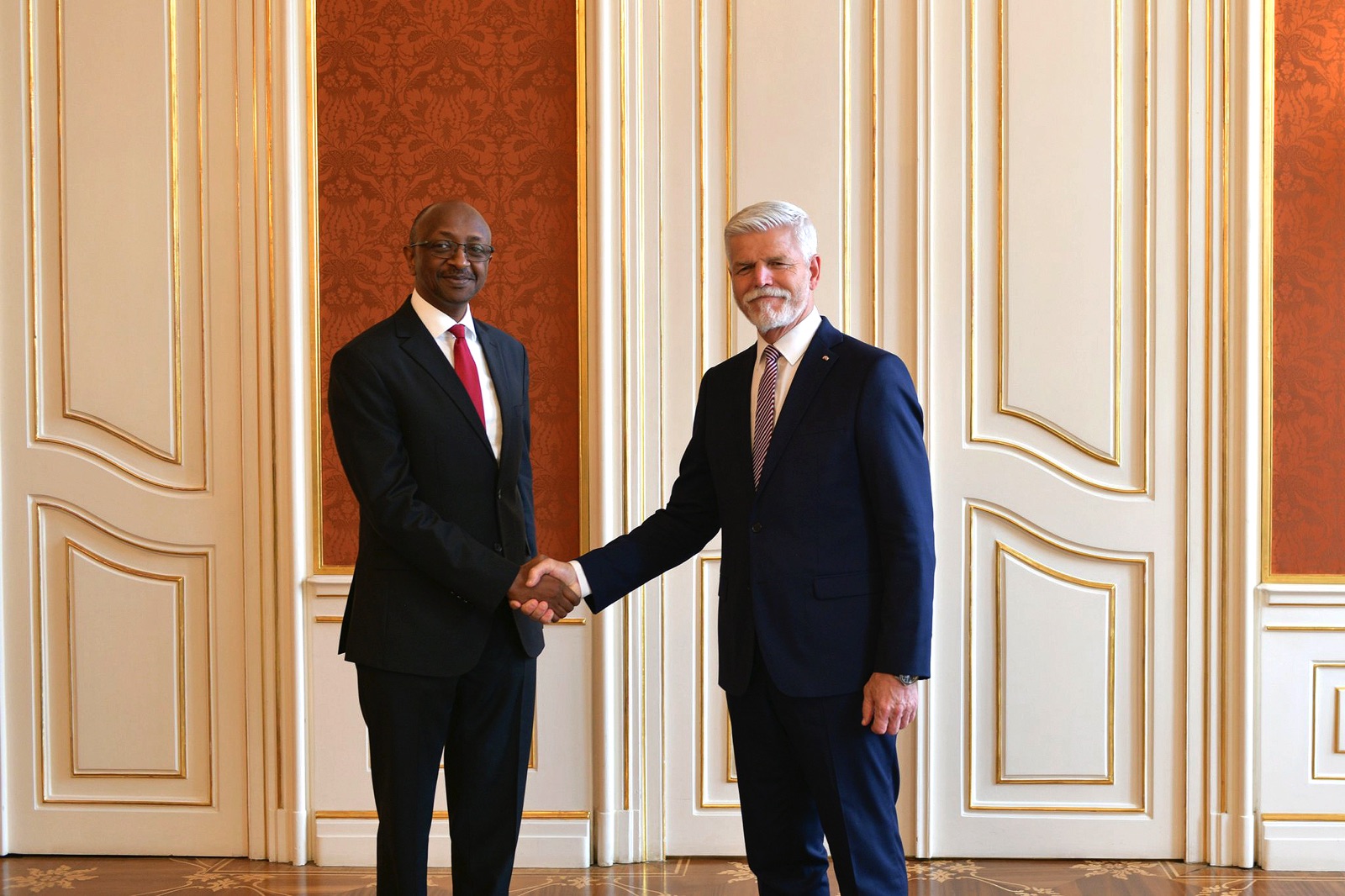Africa’s importance is growing

H.E. Mr. Richard Masozera, Ambassador of Rwanda
Text: Martina Hošková and M.Zisso; Photo: Archive
Can you tell us about yourself?
First of all, I would like to thank you for affording me this opportunity to be interviewed by your magazine. I have been Rwanda’s Ambassador to the Czech Republic since August 2023.
I have served in Government for the last thirty years, in a broad range of areas. I am a medical doctor by training, and I graduated from medical school in Uganda – where I was a refugee – in 1989.
My parents fled to Uganda, from Rwanda, in the early 1960s after the political upheavals in Rwanda. As refugees, living in exile, we always felt Rwanda was home.
My desire to return home is what shaped my future – and the rest of my life – after graduating from medical school.
In 1990, I, along with many others, participated in the historic mission to return to our country in 1994, after a four-year liberation struggle. To cut a long story short: this is how I abandoned a medical career and became active in the rebuilding of my country and in the effort to address the political ills which had led to cyclical political violence, as well as the alienation of large sections of its people from the country, for over thirty years. Since 1994, I have been involved in managerial roles in Foreign Affairs, Immigration, and the Security and Aviation sectors.
How did you become an ambassador?
I was honoured to become ambassador by political appointment, nominated by His Excellency the President of the Republic of Rwanda in September 2018.
Can you give us a picture of what the current status of Czechia-Rwanda relations is?
The Czechia-Rwanda relations are strong and continue to grow. The Czech Government’s engagement with Africa has increased in recent years, and Rwanda is a direct beneficiary of this increased Czechia-Africa engagement. At the same time, it is important to note that, currently, Africa as a whole is growing in terms of its geopolitical, strategic, security, and economic importance.
The Government of Czechia has increased its bilateral engagements with Rwanda, and these will continue to focus on stronger political and economic ties through key targeted sectors. The Government of Rwanda’s overall vision and targets overlap with the Czech Government’s priorities, and both countries are ready to lean in and cooperate. Our two countries are keen on establishing economic and diplomatic ties covering areas such as agriculture, healthcare, information and communication technology, and climate change initiatives.
In recent years, there have been high-level visits of the Foreign Ministers of the two countries to Rwanda and Czechia. Officials of both countries have met to discuss infrastructure projects, trade and industry, and investment opportunities, to name a few. A Memorandum of Understanding on Political Consultations has been signed between Rwanda and the Czech Republic, which opens the way for concrete contractual agreements in the near future. There is also a strong partnership between Rwanda and the Czech Republic in the space sector.
Finally, as a testimony to the strength of the healthy relations between our two countries, Rwanda was recently honoured to host His Excellency Petr Pavel at the 30th commemoration of the genocide against the Tutsi in April.
Sadly enough, the genocide may still be the first thing that a Czech person would think about in connection to Rwanda. What strategy does your home country apply in order to prevent violence in the future?
Before 1994, Rwanda had a tumultuous political history, with cyclical political violence culminating in the 1994 genocide against the Tutsis. Over the last thirty years, since the RPF (Rwandan Patriotic Front) took control, my country has been able to enjoy peace and calm.
This has enabled the leadership to focus on the rebuilding and reconstruction of the country, and as a result Rwanda has achieved significant economic growth and stability. The people of Rwanda today have demonstrated resilience and commitment to foster unity and development, and the ability to turn the page on a painful history.
Under the leadership of our President, Rwanda and its people have made some difficult choices to bring the country back from the brink, when many almost declared it a failed state.

H.E. Mr. Richard Masozera, Ambassador of Rwanda
The three defining choices were:
1) To stay together
Firstly, this was done by letting refugees come home – whom previous governments had denied citizenship to for over thirty years. Secondly, releasing a number of genocide suspects following a home-grown traditional form of justice known as Gacaca – many, we believed, had been used as instruments of a bad and divisive political leadership or system. Thirdly, having a new, inclusive constitution that transcended the politics of division, and entrenched the rights of women. Lastly, having comprehensive education, as well as health benefits, for all citizens.
2) To be accountable to one another as a people
Firstly, this was achieved through a decentralization of power up to the village level. Secondly, by working with our development partners and accounting for all the support that Rwanda receives. Thirdly, through building merit-based systems, whether it be in the workspace or in schools, and fighting discrimination (what eventually destroyed our country) – this has been a hallmark of all previous governments since independence. Lastly, through a strong anti-corruption drive that does not spare even high-ranking members of government.
3) To think big
Following the genocide against the Tutsi, the country had its economy, infrastructure, and social fabric destroyed. Those in leadership made a deliberate decision to think big. This approach is also what informed the liberation struggle in the years before 1994. Ambitious plans were made, and the people of Rwanda responded to the call. These plans included what we called “Vision 2020” – a reference for the targets we set to meet our development goals. Making Rwanda attractive for business includes a significant investment in a broadband network. Our President was, and still is, a strong believer in the power of ICT to leapfrog development.
Today, Rwanda is a far cry from what it was in 1994 and is a proud member of the global community.
How does the willingness of Rwanda to host immigrants fit your country’s development goals?
Thank you for this question, which has been in the news quite a lot lately.
My country Rwanda has itself been one of the world’s largest producers of refugees. Rwandans share a deep awareness of what it means to flee home. I, myself, and several of my countrymen have been refugees – as I mentioned earlier. We understand what it means to seek safety and opportunity in a new land. For this reason, Rwanda has committed itself to providing a safe haven to vulnerable people. We have done this for thousands from our neighbouring countries, and even for people as far as Afghanistan and Libya.
And yes, we also understand the role they can play in our national development.
Let’s move to the Czech Republic in our interview now, where you arrived about a year ago to take up the function of an ambassador. What have your impressions been so far?
I arrived in the Czech Republic in August 2023 and was glad it was smack in the middle of summer – when the weather was still very similar to what I was accustomed to where I was coming from. It gave me time to settle in before the temperatures dropped, after which I adjusted – with some difficulty – to the cold.
The ceremony to present my credentials was most definitely one of the highlights for me. Beyond the very colourful and elaborate event, the opportunity accorded the audience to meet – and briefly engage with – President Pavel during the ceremony, which will remain very memorable.
As I moved around Prague, I was struck by the diverse and beautiful architecture, which is very captivating and takes one back through Central European history.
I also appreciated the obvious sense of security one feels as one goes around the city. I have travelled to several countries, and the sense of safety here is palpable.
Which countries did you serve in before?
The Czech Republic is the second country in which I have served as Ambassador. Prior to this, I was Rwanda’s Ambassador to Kenya for four and a half years.
Does being an ambassador match your personality and character?
I like engaging with people, and hearing others out even when we have very different opinions.
I am also a strong believer in compromise; I am curious and always willing to learn. As an ambassador, one is involved in establishing and sustaining strong relationships between countries so the ability to engage constructively is critical. Also, many times you find that you are dealing with cultures and backgrounds very different from your own so it’s important to be a good listener, and, when you have differing opinions, it is important to have principled compromise.
What do you see as the most difficult part of being an ambassador?
As a diplomat, the biggest challenge is keeping up with the trends and pace in a fast-evolving world. You cannot afford to be behind in terms of the news cycle because it directly impacts your work.
How do you spend your free time?
I like to spend time with my family. I also like to read, occasionally watch a movie, and, here in Prague, I enjoy exploring the city.

President Petr Pavel and H.E. Mr. Richard Masozera, Ambassador of Rwanda
Do you promote your country as a holiday destination, and if so how?
Rwanda promotes itself as a holiday destination for Czech tourists through strategic collaborations with travel agencies, digital marketing campaigns, cultural exchange programs, and participation in travel fairs. While most efforts have traditionally focused on the broader European continent, the opening of the Embassy in the Czech Republic allows for a more targeted approach to attract Czech tourists specifically.
Additionally, Rwanda’s global influencer collaborations and partnerships with major football clubs such as Paris Saint-Germain, Arsenal, and Bayern Munich significantly enhance its visibility. Events such as Kwita Izina, the annual naming ceremony of newborn gorillas, feature renowned public figures and are broadcast internationally, further boosting Rwanda’s profile as a premier travel destination.
The country’s renowned attractions include mountain Silverback gorillas in the Volcanoes National Park and Safaris in Akagera National Park, to only name a few. Rwanda’s strong emphasis on safety makes it an attractive destination for high-profile visitors, whose social media endorsements further boost Rwanda’s appeal. To reflect this safety, Rwanda has been ranked 2nd safest country worldwide for women to travel to, after Slovenia.
Lastly, Rwanda focuses on sustainable tourism practices, supporting local communities and conservation efforts.
In June 2019, as part of Rwanda’s conservation efforts, Rwanda and Czechia achieved a historic milestone with the largest-ever translocation of rhinos from Europe to Africa. Five critically endangered eastern black rhinos were successfully relocated from the Czech Republic’s Safari Park Dvůr Králové to Rwanda’s Akagera National Park. This initiative has been highly successful, increasing the park’s rhino population to over twenty and contributing to the expansion of the species in their natural habitat.
In July, Rwanda celebrates its National Day. What are your thoughts on this occasion?
The National Day we remember this month of July is the liberation of our country on July 4th, 1994, when the genocidal regime and the Rwanda Armed Forces were defeated by the Rwanda Patriotic Front, ending the genocide against the Tutsi. Rwanda moved from being led by oppressive regimes – which espoused politics of division – and embraced democracy and participatory politics. What I wish for my country is that we as Rwandans continue to rally behind our leadership, preserve national unity, and continue contributing to national development.
The peace and stability we enjoy were won at a very high price, and this can only be sustained by continuing to work together and with determination.
To quote my President: “The endpoint of the liberation struggle was to build a state in which each of us is valued, and citizens are always at the centre of government.”
Regarding the Czech Republic, my desire is that our relationship continues to grow, and develops into a long-term partnership that is mutually beneficial, with clear economic and political goals.

